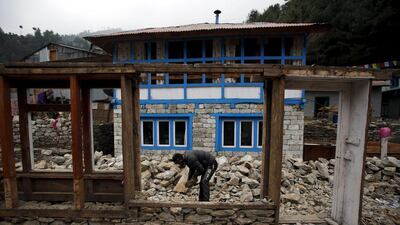One of the rules that applies to any fair fight is not to hit someone when they're down, which is why it is so sad to see that an unofficial blockade seems to be doing just that to the beleaguered nation of Nepal.
Despite the devastation caused by the earthquakes in April and May this year, politics has somehow created barriers at the very time that Nepal needs all the help it can get. The worst aspect of this is that much of the world seems to have turned its attention away.
A letter from an acquaintance who has lived there for a few years paints a stark picture of a nation in rapid decline. The question this situation poses is this: how long before the simmering cauldron of disaffection boils over, creating an even greater human tragedy than the earthquakes?
The blockade began on September 23 and has created an economic and humanitarian crisis that has severely affected Nepal and its economy. India denies it is responsible, stating that supply shortages have been created by Madheshi protesters within Nepal. The blockade has choked imports of not only petroleum, but also medicines and earthquake relief material.
The Nepalese people do not deserve this. There must be ways in which the international community and peace-loving people of this region can prevail upon those responsible to recognise the basic rights of the ordinary people of Nepal.
Peter Vine, Dubai
Learning value – without bailiffs
With regard to your news article, UAE residents can avoid a debt spiral after job loss (December 19), there are only two causes of this situation.
The first is if the company doesn’t fulfil its obligations to the employee in terms of conditions and pay on which the person is relying.
In this case, the person was relying on commission that was never paid.
The other is from doing what many people do all over the world: spending more than they can afford due to the perception that having more makes you happier. The comfort of health, security and peace of mind are substituted for another expensive car or a new home and so on.
What we lack is the realisation – before the bailiffs show up – that happiness doesn’t necessarily come from material gain.
Ibrahim Abubakar, Saudi Arabia
One of those who wrote a letter to the editor on this issue suggested staying in one’s job until one is debt free.
Although I understand the comment, it is worrisome that some people might have to stay in a job which they dislike tremendously, with management that that might be making them work excessive hours.
I hope that most people would be wise enough not to get into serious debt because nothing is secure and nothing is forever – we truly never know what tomorrow will bring.
If they do that, they would have the ability to change jobs at will or leave work altogether.
Brigitte von Bulow, Abu Dhabi
I recommend avoiding these problems by having no loans.
It’s an amazing feeling to be debt-free by working hard but living simply. That’s real freedom.
Mariann Gellert, Dubai
Why are villas so enormous?
After reading about the cost of housing in the capital (Rising Abu Dhabi rents spur expatriate moves, November 24), I don't understand why so many huge villas are being built when people can't afford them.
I really like the villa I live in but I don’t know whether we can stay next year because we have no idea what the rent will be.
It’s a big villa – way bigger than we actually need, but in Khalifa city where we live, there are no small villas – so it comes with a big price tag.
My compound has six large villas, mostly containing expatriate families with two or three children, so there are lots of empty rooms. Why not build 10 smaller villas with three or four sensible-sized bedrooms, no extra living rooms upstairs and a small garden. At least people could afford to rent them.
Karen Leach, Abu Dhabi
Few laments for hoverboards
Until I read your article, It's a lot less bother to walk than it is to hover (December 20, I never even knew these were the "in" thing. And now they're out?
Amera Al Awadhi, Dubai
Come to my building and all the young boys are on them constantly. I think they’ve forgotten how to walk.
Andrea Kat, Abu Dhabi
Good. I’m always scared one of these contraptions is going to trip me up.
Bindu Dilip, Dubai

